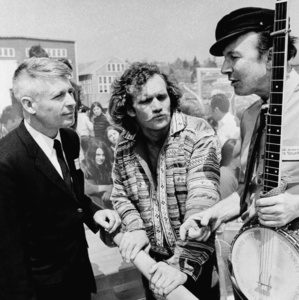
Iconic folk singer Pete Seeger, holding banjo, con- fers with Maine Gov. Kenneth Curtis, left, and skip- per of the sloop Clearwater Alan Aunapu, center, at launching ceremony for the Hudson River sailing vessel in late June 1969, at South Bristol, Maine.
SLOOP CLEARWATER DRAMATIZES NEED
TO CLEAN UP INLAND WATERWAYS
Lead Belly’s ‘Goodnight, Irene’
was first big hit with Weavers
By Alan Z. Forman
When the quintessential folk singer of 20th Century America died last week at the age of 94, Voice of Baltimore searched for a local angle to justify eulogizing this iconic figure who returned to Charm City in May for what may have been the first time since his classic Fort McHenry concert on Independence Weekend 1970.
Pete Seeger performed in Maryland any number of times over his long career, but his 1970 visit was significant for several reasons, not the least of which being that he sailed into the Port of Baltimore aboard his newly minted Hudson River sloop, the Clearwater, launched just a year before, a replica of the sailing ships of bygone days before America’s inland waterways — like the Patapsco River and Chesapeake Bay — surrendered to pollution.
Seeger performed at Fort McHenry in the Inner Harbor that day, at the birthplace of our national anthem, and included in his repertoire the original version of the erstwhile barroom melody whose high notes nearly all of us find so hard to reach, “To Anacreon in Heaven” — that was in Francis Scott Key’s mind when he penned “The Star Spangled Banner” while being held captive aboard a British warship here in 1814 — a tune whose original verses glorify wine, women and song.
Seeger loved those lyrics, although he stayed married to the same woman for nearly 70 years — a rarity in show business these days — until her death last summer at age 91, just days before their wedding anniversary. The couple married in 1943 and raised three children.
His parents, who divorced when Pete was seven, were both classical musicians, as was his stepmother, who his father married six years later.
His purpose in being in Baltimore on that July 4th weekend was to protest — a Pete Seeger specialty — against chemical and biological warfare. As usual, his protest was in song, the way in which he best expressed himself, and which often got him into trouble for his left-wing political views.
In 2011, despite physical frailty that prevented him from carrying his beloved long-neck banjo, Seeger led an Occupy Wall Street protest in New York, two miles through downtown Manhattan.
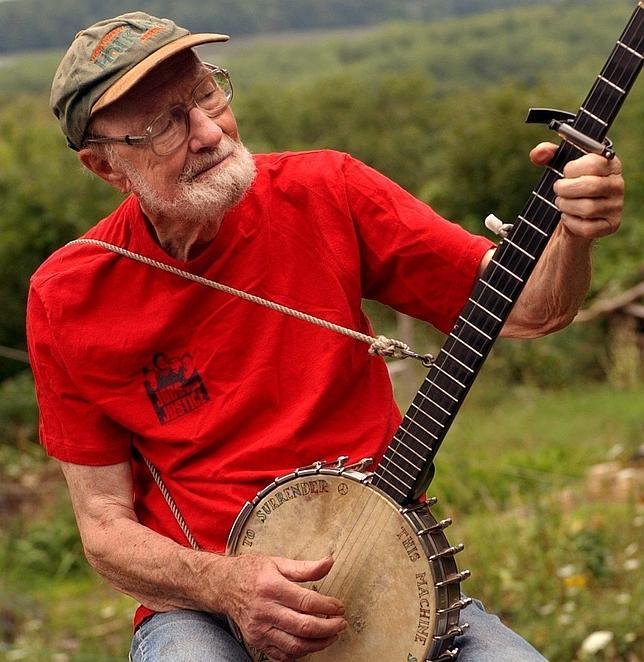
Seeger resurrected the five-string banjo from oblivion, modifying it to fit his needs with a longer-than-usual neck. Inscription on instrument’s face reads, ‘This machine surrounds hate and forces it to surrender.’
He was a study in contradictions, protesting throughout his long career against capitalism, despite regularly earning a six-figure annual income and amassing millions in personal wealth, much of which he donated to the causes he deemed important, such as protecting and cleaning up the environment, that were near and dear to his heart.
When he went to trial in 1961, was convicted and sentenced to 10 one-year terms in jail — to be served simultaneously — for contempt of Congress, he asked permission to defend himself in song, but was denied the opportunity by an angry judge who had little appreciation for his naïveté.
When he was subpoenaed to testify before Congress, he brought his banjo with him to the Capitol, but was not allowed to sing there either.
He declined to take the Fifth Amendment then, but refused to answer questions about his friends and affiliations, leading to his later conviction for contempt — which was ultimately overturned when an appeals court ruled the indictment was inherently flawed.
Seeger was a communist — not a Soviet overthrow-the-capitalistic-government-by-violence brand of Communist, but a communist nonetheless. He joined the party in 1942 when Hitler invaded Russia during World War II — the same year he was drafted into the U.S. Army, where he spent more than three years entertaining servicemen in the South Pacific— but eventually became disillusioned by the hypocrisy and cruelty of the Soviet system and its leaders, and “drifted away” (his words).
He was always a “patriotic American,” he told a young Baltimore Sun reporter who would later write for Voice of Baltimore, in an interview on Cape Cod, in Falmouth, Mass. in 1969, as was his close friend and fellow folk singer Woody Guthrie, who died in 1967.
Seeger maintained a lifelong friendship with Guthrie’s son Arlo, best known for the late 1960s’ song and film, “Alice’s Restaurant.”
As recently as 1995, however, Seeger told the New York Times, “I still call myself a communist, because communism is no more what Russia made of it than Christianity is what the churches make of it.”
Aboard the Clearwater in Cape Cod in 1969 he revealed he was contributing half his yearly income to the Hudson River Sloop Clearwater Inc., an environmental organization he founded three years earlier and which still exists today, based in the Hudson Valley city of Beacon, N.Y., where Seeger lived until his death in New York City a week ago Monday.
Just ten days before, he was chopping wood at his upstate home, his grandson told the Associated Press. Kitama Cahill-Jackson said his grandfather died peacefully in his sleep around 9:30 p.m. Jan. 27th at New York-Presbyterian Hospital, surrounded by family members, where he had been for six days.
The organization seeks to protect the Hudson River, wetlands and other U.S. inland waterways through advocacy and public education, and is most noted for its annual music and environmental festival, the “Great Hudson River Revival,” better known colloquially as the “Clearwater Festival.”
A 106-foot sloop built at Kennebunk- port, Maine by volunteers, the Clearwater was launched in June 1969; and the crew, with Seeger on board, played its first concert in Portland, Maine, followed by a series of fundraising performances on Cape Cod, beginning in Falmouth, less than a month later — the week before Neil Armstrong walked on the moon and Edward Kennedy drove his car off a Chappaquiddick bridge, killing his 28-year-old female companion Mary Jo Kopechne and sinking his chances of ever becoming President.
Seeger looked and dressed the part of the progressive troubadour, apparently oblivious to and disinterested in the worldly business of making money. He wore tattered work shirts and torn blue jeans, way before the designers made such clothing popular.
But with the exception of the decade of the 1950s, when he ran afoul of the House of Representatives Committee on Un-American Activities, better known as HUAC, and was blacklisted and not permitted to perform in public or on television, Seeger was enormously successful, both artistically and financially.
His 1967 performance on the highly rated “Smothers Brothers Comedy Hour” was hailed as the unofficial end of the McCarthy/HUAC blacklist.
His best-known compositions, “Where Have All the Flowers Gone,” “If I Had a Hammer,” and “Turn! Turn! Turn!” — the latter adapted from the Book of Ecclesiastes — were huge hits for him as well as other groups and individual singers who covered the songs.
His reworking of the gospel tune “We Shall Overcome” became the anthem of the American Civil Rights Movement of the 1960s and beyond.
He first came to prominence in 1950 when his quartet, the Weavers, recorded Huddie Ledbetter’s 1933 classic, “Goodnight, Irene” (also known as “Irene, Goodnight”). It was the Weavers’ first big hit.
Ledbetter, who was better known by his stage name Lead Belly, was singing a risqué version of the song as early as 1908, which he learned from two of his uncles.
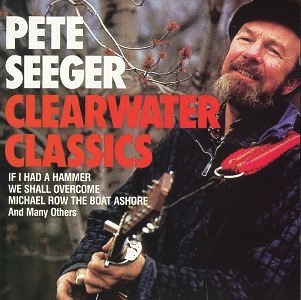 A year after his death the Weavers recorded their sanitized version, which lasted 25 weeks on Billboard Magazine’s Best Seller chart, and a month after the Weavers’ release, Frank Sinatra covered the song, with orchestra and chorus directed by Mitch Miller, which lasted another nine weeks on the Billboard chart.
A year after his death the Weavers recorded their sanitized version, which lasted 25 weeks on Billboard Magazine’s Best Seller chart, and a month after the Weavers’ release, Frank Sinatra covered the song, with orchestra and chorus directed by Mitch Miller, which lasted another nine weeks on the Billboard chart.
Seeger had met Lead Belly after dropping out of Harvard in 1938 when failing grades caused him to lose a partial scholarship. One of his Harvard classmates, John F. Kennedy, would later become President in 1961.
He met Woody Guthrie in 1940 when the two of them sang at a fundraiser for California migrant workers. He formed the Weavers in 1948 with Lee Hays, Fred Hellerman and Ronnie Gilbert.
The group disbanded in 1953 when Seeger’s earlier Communist Party affiliation was revealed, causing bookings to dry up, but then reunited for a Carnegie Hall concert in 1955.
When the group decided in 1958 to perform a cigarette commercial, Seeger left again, this time in protest. The folk music revival of the 1960s then revived his career.
He did not win a Grammy until 1997, for Best Traditional Folk Album, “Pete,” a category he won a second time in 2009. He was inducted into the Rock and Roll Hall of Fame in 1996.
A beanpole of a man, the six-foot three-inch Seeger was a commanding presence onstage, towering over most of his fellow performers.
Following a concert on Cape Cod in 1969, where he typically encouraged the audience to join in for many of the songs, he somehow maneuvered his gangly legs and lanky frame into the jump seat of a 1967 Karmann Ghia, along with his 12-string guitar and trademark five-string banjo of his own design, to ride from the location of his crew’s performance in Falmouth back to the Woods Hole waterfront for an interview aboard the Clearwater.
The Sun buried the story on an inside page of an insignificant section of the newspaper. But less than a week later, Seeger and the Clearwater sailed triumphantly into New York Harbor, attracting international attention for his selfless effort to clean up the Hudson River — and by extension, America’s polluted inland waterways.
alforman@voiceofbaltimore.org
Editor’s Note: The original crew members of Seeger’s sloop, the Clearwater, were all folk singers and musicians, led by Seeger and Alan Aunapu, the vessel’s skipper. With Aunapu at the helm, they sailed the ship from port to port by day, performing concerts at every stop along the way in the evenings.

Pete Seeger, left, and Bruce Springsteen perform duet at President Barack Obama’s first inauguration (Jan. 20, 2009).
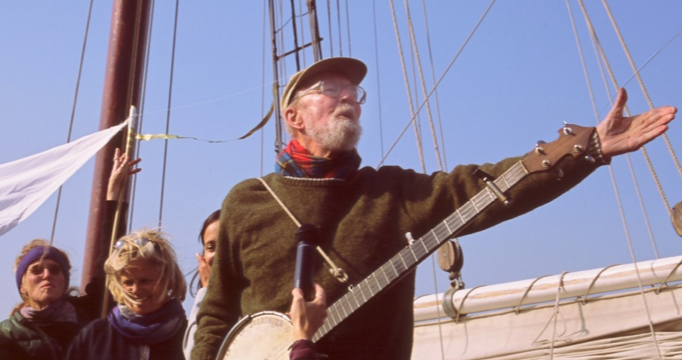
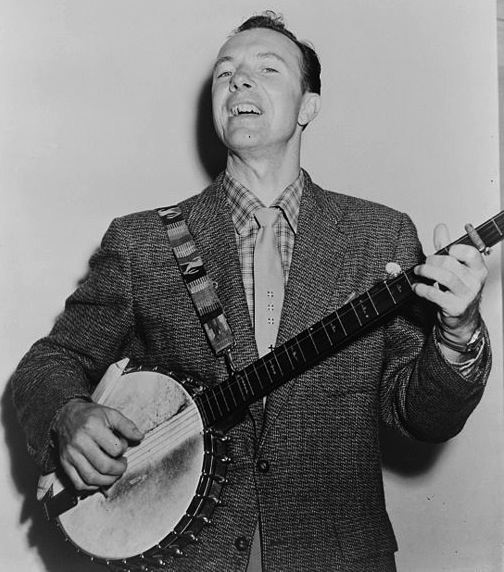






February 5th, 2014 - 9:02 AM
Just because someone makes money does not make them a capitalist. A capitalist is someone who makes money off of money and by taking disproportionate advantage of the labor of others. Pete Seeger was justly rewarded for his creativity and hard work. I suspect that the record companies made more money off of him than he ever made himself. And if you read the transcripts of his testimony in the HUAC hearings, you will see that he did not take the 5th. He just kept insisting that no American should have to answer questions about his associations, about what legal actions he did or did not make, or what his convictions were. I can not think of any public figure, over as long a period, who acted with such integrity. In the end, mensch, not a mensch? In his case, a resounding: “Mensch!”
February 5th, 2014 - 11:52 AM
Thanks for the clarification, Arnold, Voice of Baltimore much appreciates your input. Plus we’re in complete agreement with your assessment of Seeger’s integrity, also his patriotism. Forty-five years after the fact, he remains one of the most fascinating individuals we have ever interviewed.
The correction has been made. When Seeger sat before the HUAC panel in August 1955 he did not invoke the Fifth Amendment as previously stated in error. However he did refuse to respond to questions about his friends and affiliations, emphatically declaring: “I am not going to answer any questions as to my association, my philosophical or religious beliefs or my political beliefs, or how I voted in any election, or any of these private affairs. I think these are very improper questions for any American to be asked, especially under such compulsion as this….”
An aside: It’s interesting to note that the much honored film director, Elia Kazan, named names and outed his friends to HUAC, leading to the end of his close friendship with playwright Arthur Miller, who, like Seeger, refused to do so.
February 6th, 2014 - 1:18 PM
Such a long and wonderful life! He made a huge difference both with his work as an activist and a musician. I found this lovely tribute video with an original song written by an activist and singer that knew him that other readers might enjoy! http://goo.gl/7b4pQx
Pete will be missed.
February 7th, 2014 - 3:15 AM
Awesome video, Amy, a beautiful tribute by Aurora Barnes. Thanks for sharing.